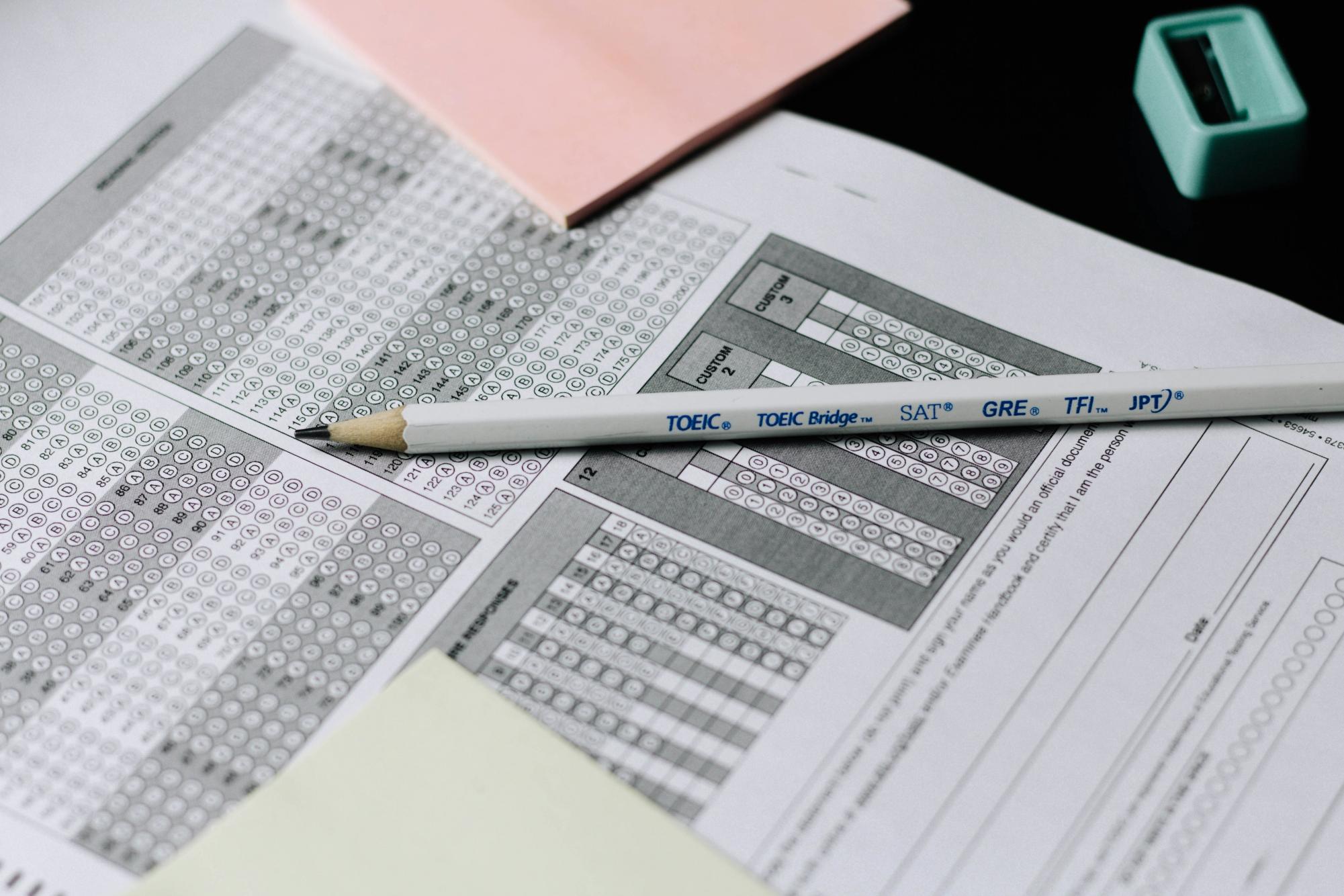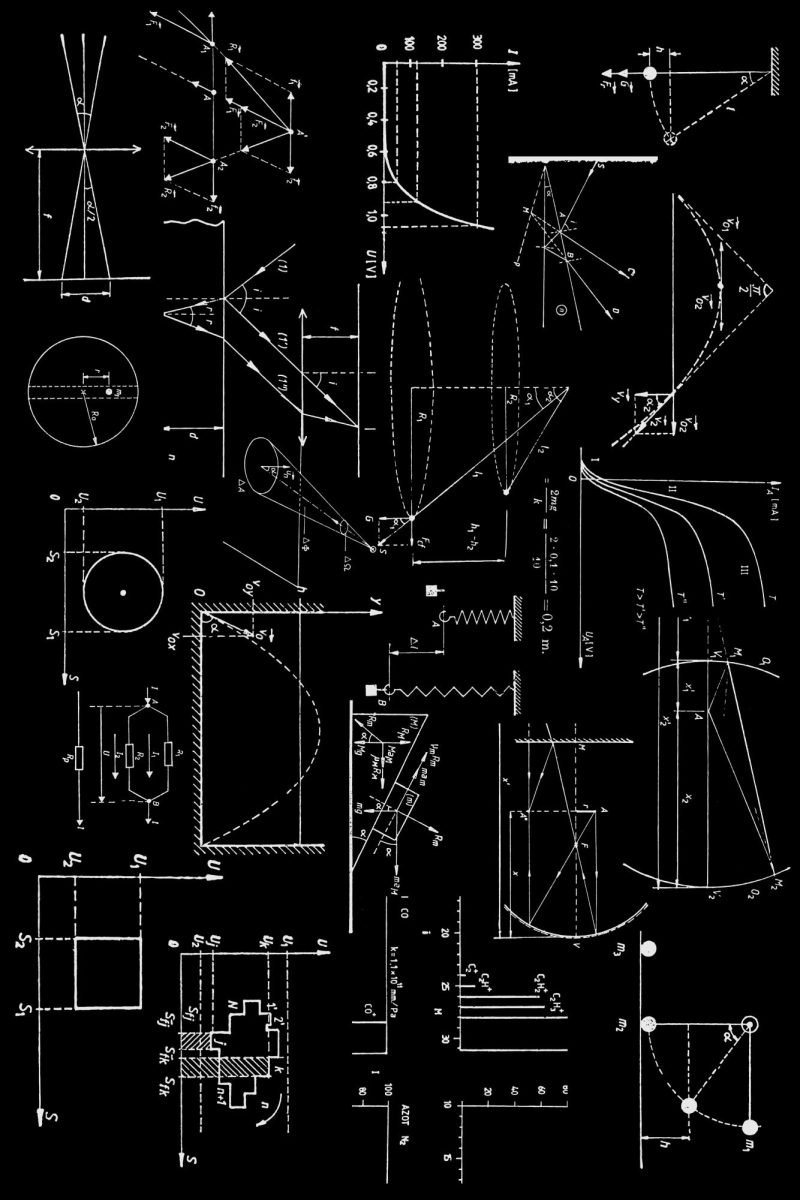A comprehensive guide to AP exams

For many Green Hope students, the high school level courses offered aren’t enough to fulfill their intellectual curiosities or academic drives. Instead, kids often opt for Advanced Placement (AP) classes, which are college level courses taught within Green Hope and other high schools around the country.
In order to determine if kids receive college credit, these classes require students to take AP exams. Despite the fact that these AP results cannot impact one’s grade within the course, scoring well on these exams can save both time and money in college. A high AP exam score allows one to be exempt from certain courses in college. These exams are offered each May, regardless if the class was taught during the first or second semester. Therefore, many students have to cram for their upcoming AP exams as they forget critical topics taught earlier in the year. In order to avoid late nights and long study sessions, it is recommended to develop a plan for studying for these exams.
The 38 different available AP courses are grouped into different sections. This article will cover the best tips for each major discipline of AP exams, including mathematics, science, english and social studies, while also mentioning some worthwhile tips for other specific exams.
Math is among the most valuable credits when moving to college, and many Green Hope students have tremendous success when taking AP Math exams. With the addition of AP Pre-calculus, there are four AP Math classes offered at Green Hope.
AP Pre-calculus
2023-24 is the first year College Board is offering AP Pre-calculus. The exam will begin with 28 multiple-choice questions (MCQs) with no calculator and 12 multiple-choice questions with a calculator. For these questions, students are allotted approximately three minutes per question, so it is important that students understand the content well beforehand.
After the multiple choice section, students will complete four free-response questions (FRQs). Test takers are given 15 minutes to complete each FRQ, the subject of which will be known ahead of time. Per College Board, the first FRQ is on Function Concepts and question two on Modeling a Non-Periodic Context. For the first two questions, students will use a graphing calculator. The third and fourth questions are on the topics of Modeling a Periodic Context and Symbolic Manipulations respectively.
The exam will be on May 13 in the afternoon. Students should ensure that they have a charged calculator and have practiced for the FRQs. If possible, it is also advised that students look over the tests that they took during the school year to review concepts from the earlier units.
AP Calculus AB/BC
One of the most leniently curved exams, the AP Calculus exam provides a great opportunity for college credit the morning of May 13. Whether students are taking the AB or BC exam, they will both sit down for only one exam. The BC exam covers topics from both AB and BC, so when scores are released, students can see an AB subscore that can be used for college credit if their BC score doesn’t qualify.
For both AB and BC, the exam begins with 30 inactive MCQs at two minutes per question followed by 15 active MCQs at three minutes per question. After the multiple-choice section, students will complete six FRQs at 15 minutes apiece. Many FRQs include three to four parts in each question. The first two questions are calculator active and the last four are calculator inactive. Students are permitted to look back at calculator active questions in the last hour but do not have access to their calculators.
College Board doesn’t give the specific topics for each FRQ as they do for the Pre-calculus exam, but here are some trends from past exams.
AB: Q1: connecting f(x), f’(x) and f’’(x); Q2: Integrating using a calculator and cross sections; Q3: Using graph of f’(x) to integrate and find increasing and decreasing by hand; Q4: Riemann sums and related rates; Q5: Differential Equations; Q6: Particle movement.
BC: Q1:connecting f(x), f’(x) and f’’(x); Q2: Parametrics; Q3-5 (in various orders): Differential equations, cross sections and related rates, end behavior (infinite limit theorem); Q6: Always Taylor and Maclaurin series, including Lagrange error.
When preparing, a critical piece is mastering the FRQs. Each FRQ for both exams is released to the public after the exam and also has scoring guides, allowing students to check their work. One can search “2022 BC released FRQs” and the questions and scoring guidelines will be the first result.
AP Statistics
The only math AP exam where students can use a calculator for the entirety of the exam, students are also given a reference sheet with necessary formulas for the AP Statistics exam. The exam begins with 40 multiple-choice questions to be completed in 90 minutes. The multiple-choice questions make up 50% of the score, and the FRQs make up the other 50% of the score. The FRQ section is also 90 minutes long, with six questions covering at least four different topics.
College Board gives the following as the topics of the FRQs:
- One multipart question with a primary focus on collecting data
- One multipart question with a primary focus on exploring data
- One multipart question with a primary focus on probability and sampling distributions
- One question with a primary focus on inference
- One question that combines two or more skill categories
While students are given a formula sheet, it is very important that they know when to use the formulas and what they represent. The front page focuses on slope, probability and Chi-squared, while the back page focuses on parameters and error. While preparing, it is also critical that students review how to use their calculators, as many questions will be answered using the 2nd Vars function. In addition to the math questions, an important part of the AP Statistics exam is designing experiments and collecting data. Taught as the third unit, designing experiments covers 12-15% of the AP exam and focuses on eliminating bias and refraining from extrapolating data past the subject of an experiment.
AP Science exams can range in structure and content drastically, depending on the specific course and covered information. There are seven total AP Science courses, including AP Biology, AP Chemistry, AP Environmental Science and four various levels of AP Physics classes. The study techniques and review strategies vary not only depending on the content covered, but also the structure for the actual AP exam, which will be explained in detail.
AP Environmental Science and AP Biology
AP Environmental Science (APES) is structured with 80 MCQs, one of the lengthier MCQ sections, and then has three FRQs that typically require an advanced understanding of topics and vocabulary to score perfectly. For this exam, it is highly recommended to work with one’s teacher on common vocabulary, and focus as much as possible on concepts or terminology. Making flashcards and practicing with matching definitions to words is one of the easiest ways to refresh on content that is easy to forget in the long gap between the end of the first semester and the exam date.
A similar structure of review is recommended for AP Biology, but with slight tweaks due to the increased number of written responses on the exam. Biology, regardless of the level, is a vocabulary and concept dense course. However, it only has 60 MCQs, which means that there are less definition based questions on this exam. To compensate, the AP Biology exam has six FRQs, which each require students to answer multiple parts of a prompt. These questions usually include opportunities for students to contrast systems, explain concepts and demonstrate their level of understanding in paragraph form. A great strategy for the FRQs is to look up released AP questions, which will come directly from tests in the past, and practice those. Additionally, having a partner to ask questions from a list of key terms with stems including “How does this work?” or “Explain the differences between…” can be incredibly beneficial for preparing for the AP Biology exam. Lastly, be sure to understand any common diagrams or graphics used within the class, as it is likely that these can show up on the test.
AP Chemistry and AP Physics
The other type of AP science exams includes AP Chemistry and all of the AP Physics courses offered. Since these exams are more mathematically based than AP Biology or AP Environmental Science, it is critical that students practice frequent equations for these exams. Regardless of the level of chemistry class, major topics including conversions, significant figures and reactions should be a primary focus of practice. Oftentimes the AP exams will require calculations to be shown on FRQs, so be sure to understand not only how to get an answer, but how to show correct work to score points.
The AP Chemistry exam has 60 MCQs, which will likely focus on atomic properties, equilibrium and intermolar forces. While there might be some math based questions in the MCQ, it is likely a simple calculation which requires only one or two steps. There are seven FRQs, distributed into two different categories – short and long. The shorter questions will have only a couple different parts of a question that must be answered, whereas longer questions will have more steps, and more opportunity for application, requiring completely demonstrated understanding of both mathematical formulas and conceptual processes.
AP Physics is one of the most wide ranging AP topics, because there are up to four different levels of this course. AP Physics I and II are algebra based, meaning they only require a mathematical understanding up to NC Math 3 or an equivalent level course. Both versions of AP Physics C (Electricity/Magnetism and Mechanics) require students to grasp calculus level math. For these exams, practice is key. For both sections of the exam, formulas and calculations dominate the focus of questions. It is best to comprehend concepts, but it is even more imperative to understand the formulas provided and how to implement them. Working on released FRQs will also be extremely beneficial for this exam, as they provide insight on the types of situations provided on the exam. Regardless of the type of physics, focusing on the mathematical concepts will ensure an above average score.

Preparing for the AP English exams can seem daunting, but with the right mindset and strategies, it is entirely achievable. Whether you are aiming for a top score or simply want to sharpen your skills, here are some essential tips to help you ace your AP English exams.
Understand the exam:
Familiarize yourself with the exam format and expectations. Both the AP English Language and AP English Literature exams are roughly three hours long and begin with the one hour multiple choice section with 45-55 multiple choice questions. After the MCQs, students will have two hours to complete the written portion of the exam, which includes three different prompts.
Practice, practice, practice:
Regular practice is essential for sharpening your skills and building confidence for both the MCQs and FRQs. Time yourself with practice exams to recreate the testing environment and improve your pacing and time management. Go through student sample responses to identify strengths and areas for improvement, while paying attention to structure, evidence and coherent line of reasoning. The more practice you do, the more prepared you will be for the exam.
Annotate and analyze:
Use active reading strategies such as annotation to highlight key passages, identify rhetorical devices and motifs. Practice reading strategies to extract deeper meanings from complex texts and uncover interpretation.
Master literary techniques:
Become familiar with common literary techniques used in texts, such as diction, imagery, irony, symbolism and similes. Understanding how authors use these elements will strengthen your ability in analyzing texts effectively.
Practice timed writings:
Writing is a skill that improves with practice. Set aside a few hours to practice each type of timed writing while being timed. Focus on crafting well-written essays with clear thesis statements and relevant evidence from the texts. Strive for precision and coherence in your writing, and strive to convey your complex ideas concisely.
Broaden your literary horizons:
Expand your exposure to diverse works across all genres, cultures and time periods. Reading will not only enrich your understanding of literary works, but will effectively equip you with a varied range of examples to use in your timed writings. Be prepared to analyze both classic and modern literature, as the exam features a wide range of reading selection.
For social studies and history AP exams, there are a wide variety of courses and topics covered that are necessary to understand.
AP United States History, World History and European History
Within history, AP United States History, AP World History and AP European History are all offered. For these exams, people and events should be a major focus of review. One great way to prepare is to create a timeline with influential people, impactful events and then practice expanding upon these various significant points. All of these exams are structured with immense amounts of writing, including multiple different types of FRQs. Thus, it is imperative that one can describe major figures or events in the specific historical context. These exams include both analytical writing and persuasive writing, so be sure to review specific events and information that way interpretations or arguments hold merit, scoring more points on the exam. AP European History is an art-dense course, so understanding famous works and attributing them to time frames is a critical, yet niche, skill.
AP Comparative Government and United States Government and Politics
Another sector of the AP Social Studies courses regards governmental structures. Both AP Comparative Government and AP United States Government and Politics focus on how governments interact with each other, both internally and internationally. In order to review the functions of each government or sector, it is best to list out the specific functions of each group. Additionally, using a timeline or list of significant events, documents or people can be beneficial, but for these exams the questions tend to focus more on the specific relationships and less on historical changes.
AP Psychology and Human Geography
The last group of social studies AP exams includes the study of people or society, which includes AP Psychology and AP Human Geography. Both of these exams are vocabulary dense, meaning that memorization is one of the most important skills for scoring well on these exams. While they are structured differently, as AP Psychology has 100 MCQs and Human Geography has only 60, both tests require an in-depth understanding of many people, terms and concepts. Therefore, creating flashcards or matching practices for definitions and terms is incredibly beneficial for the test. Scoring well on the FRQ sections in both of these exams depends primarily on vocabulary understanding, so no additional strategies are required. There are plenty of comprehensive lists of terms that can be found online, and using online flashcard sites, like Quizlet, can aid the review process substantially.
AP Microeconomics and AP Macroeconomics are both offered under the social studies category as well, but Green Hope does not offer either of these courses, and thus neither of these exams can be taken at the school.

While these are just the main four subsets of AP exams, there are plenty of resources for some of the other AP exams not covered in this article. For any world language AP exam, maximizing terminology sets students up for success. Most of these tests include reading, writing, speaking and listening sections, which means a balanced practice of all four of these skills is essential to score well on the exam.
AP Computer Science Principles and AP Computer Science A revolve around comprehending the problem or situation, and then calling upon programming to complete the question. For these, it is recommended that one doesn’t focus solely on learning how to write code, but when to implement specific lines and how to explain code when provided. Many of these questions will include “what is the output value when…” so following steps of code is a vital skill.
Additionally, AP Art exams can include portfolios of one’s own work, or interpreting sections of other pieces. Working closely with one’s teacher prior to the exam is the best way to maximize the quality of one’s own work as well as exposure to other paintings, structures, songs or any other type of art produced.
Regardless of the type of AP exam, refreshing one’s memory in preparation is essential for success. Scored from 1-5, each exam allows plenty of opportunity to score highly, between MCQs, FRQs and portfolios of work. Scoring a 3, 4 or 5 is a passing grade and generates opportunities for earning college credit. Armed with the plethora of tips above, be sure to start studying as soon as possible, and don’t forget to balance current classes with upcoming exams. Don’t become too overwhelmed during this exam period, get ample rest and understand that it’s nearly impossible to get every point – just attempt every question and do your best.
The staff of the GHFalcon would love a donation to help the journalism program at Green Hope continue to flourish. Many of our donations go to towards improving the materials that we deliver to you in electronic format. Thank you so much to those that are able to donate.


















